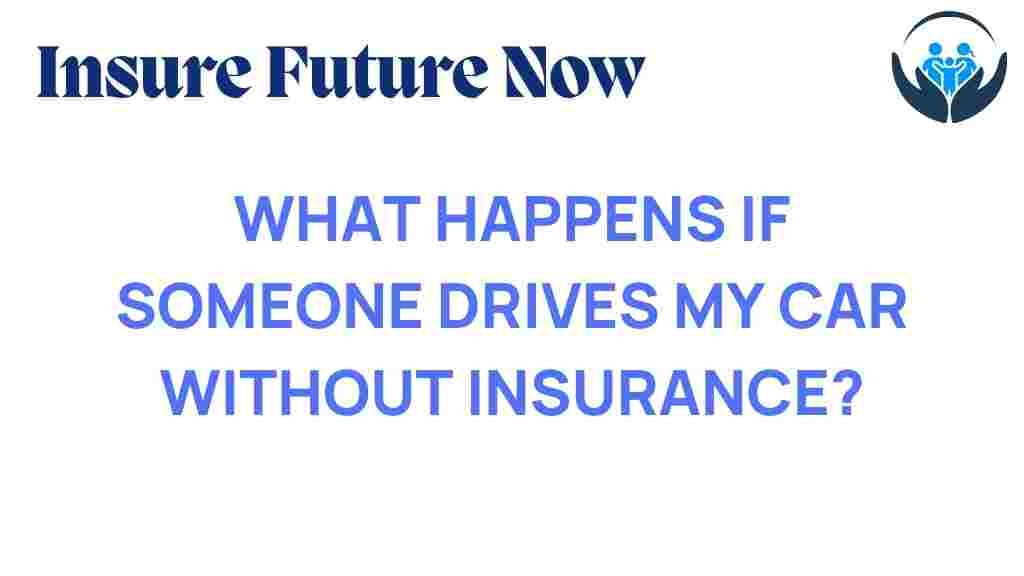Unraveling the Mystery: What If Someone Drives Your Uninsured Car?
When it comes to car ownership, understanding the implications of allowing someone to drive your vehicle is crucial, especially if the car is uninsured. This guide will explore various facets of the situation, including the legal issues surrounding uninsured cars, potential consequences of car accidents, and how auto insurance plays a role in liability and coverage. Whether you are considering lending your car to a friend or facing a situation where someone else has driven your uninsured car, knowledge is power.
Understanding the Basics of Uninsured Cars
An uninsured car is a vehicle that does not have the necessary auto insurance coverage required by law. This can lead to significant legal and financial repercussions for the owner and the driver involved in any incident. Here are some important concepts to understand:
- Liability: In the event of an accident, liability refers to your legal responsibility for damages or injuries caused to another party.
- Driving Laws: Each state has specific laws governing car insurance, and driving an uninsured car can lead to legal penalties.
- Coverage: Auto insurance provides different types of coverage, including liability, collision, and comprehensive, which help protect you financially in the event of an accident.
The Risks of Allowing Someone to Drive Your Uninsured Car
Let’s delve deeper into the risks associated with someone driving your uninsured vehicle. These risks can have dire consequences, both financially and legally.
Legal Issues
When someone drives your uninsured car, several legal issues may arise:
- Traffic Violations: If the driver gets pulled over for a traffic violation, you may face fines for having an uninsured vehicle.
- Liability for Accidents: If an accident occurs, you may be held liable for damages, which could lead to costly lawsuits and compensation claims.
- Penalties: Depending on your state, penalties for driving uninsured can include fines, license suspension, or even criminal charges.
Consequences of Car Accidents
In the unfortunate event of a car accident involving your uninsured car, the consequences can be severe:
- Damage to Property: You would be responsible for paying for any damages to other vehicles or property.
- Medical Expenses: If the driver or passengers sustain injuries, you could be liable for their medical bills.
- Insurance Claims: Without insurance coverage, you cannot file a claim for damages, which means you would have to cover all expenses out of pocket.
What Happens If an Uninsured Driver Causes an Accident?
If someone drives your uninsured car and causes an accident, the situation can become complicated:
- Primary Liability: As the owner of the vehicle, you might be considered the primary liable party, regardless of who was driving.
- Legal Action: The injured party may file a lawsuit against both you and the driver to recover damages.
- Financial Ruin: Without insurance coverage, the financial burden could potentially lead to bankruptcy or severe debt.
Step-by-Step Process to Take After an Accident with an Uninsured Car
In the unfortunate event of an accident involving your uninsured car, follow these steps:
Step 1: Ensure Safety
First and foremost, ensure everyone involved is safe. Call emergency services if there are injuries.
Step 2: Gather Information
Collect information from the other party, including:
- Name and contact information
- Insurance details (if applicable)
- License plate number
- Photos of the accident scene
Step 3: Report the Incident
Notify local law enforcement of the accident. A police report can be crucial for any future legal issues that may arise.
Step 4: Consult a Legal Professional
Given the complexities of liability and potential lawsuits, it’s wise to consult with an attorney who specializes in auto accidents and uninsured car cases.
Step 5: Communicate with the Other Party
If the other party is seeking compensation, communicate clearly and document all interactions. Avoid admitting fault, as this can complicate matters further.
Troubleshooting Tips to Avoid Issues with Uninsured Cars
To prevent problems associated with allowing someone to drive your uninsured car, consider the following tips:
- Get Insurance: Always have at least the minimum required auto insurance coverage for your vehicle.
- Know the Driver: Only allow trusted individuals to drive your car; the less familiar you are with the driver, the higher the risk.
- Use a Written Agreement: If you lend your car, consider using a written agreement detailing the terms and conditions of use.
- Understand Your Policy: Familiarize yourself with your auto insurance policy to know what is covered, especially regarding permissive drivers.
Conclusion
Driving an uninsured car can lead to a myriad of legal and financial troubles, especially if someone else is behind the wheel. Understanding the implications of liability, auto insurance coverage, and the legal issues at play is essential to protecting yourself. Should an accident occur, the consequences can be significant, ranging from financial ruin to legal troubles.
To safeguard against these issues, always ensure your vehicle is adequately insured, communicate clearly with anyone driving your car, and stay informed about your state’s driving laws. By taking proactive measures, you can mitigate the risks associated with lending your car to others.
For more information on understanding auto insurance and its implications, visit this resource. If you find yourself in a situation involving an uninsured car, seeking legal advice can provide clarity on your options and responsibilities.
This article is in the category Coverage and created by InsureFutureNow Team
